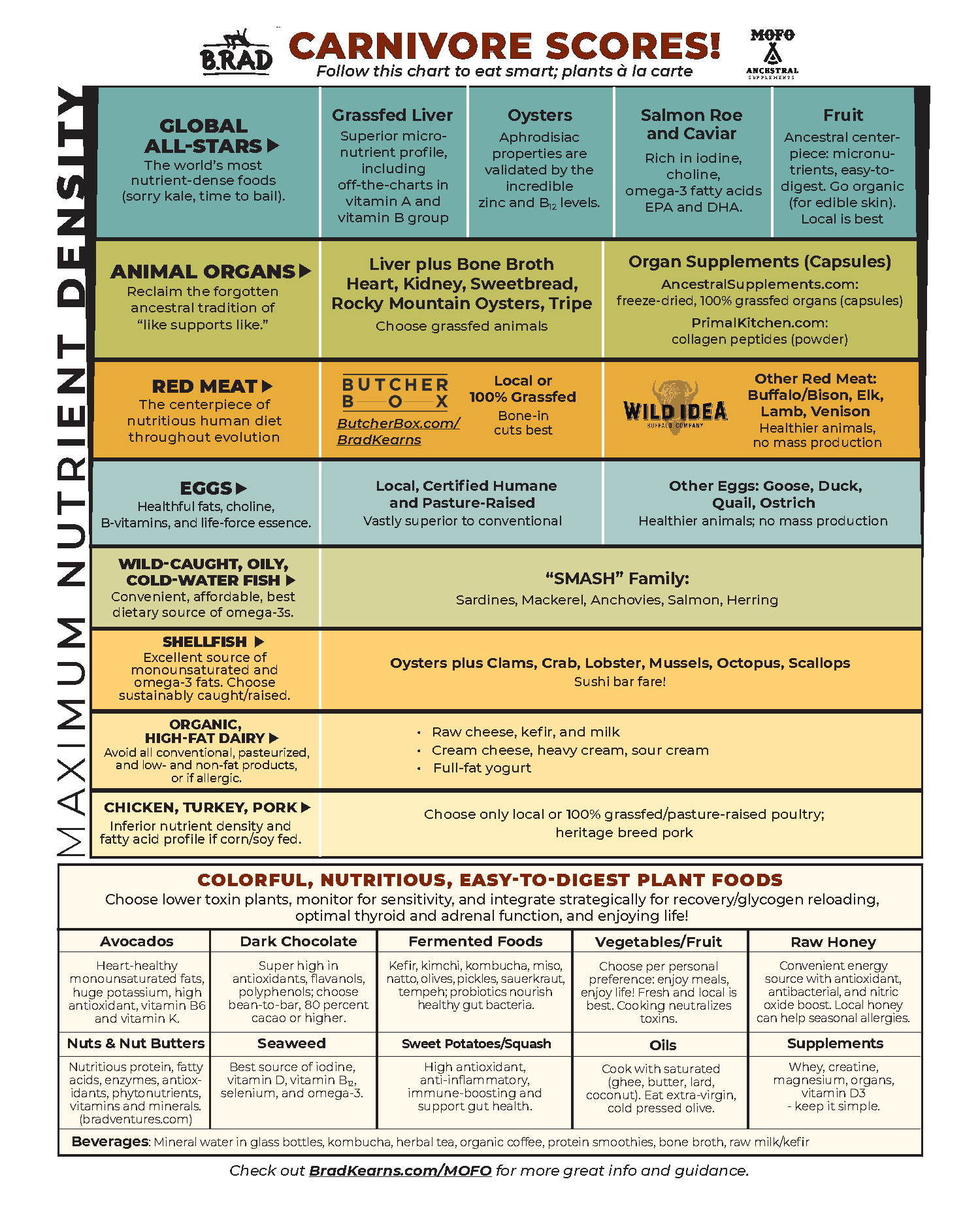In light of my recent reflections and numerous podcasts on the topic of energy balance and rethinking fasting and carb restriction for healthy, active fitness enthusiasts, I have revised the popular Carnivore Scores Food Rankings Chart (free download at BradKearns.com home page). I believe this is THE definitive guide for humans to eat the most nutrient-dense diet, and source the best foods in each category. Please download the colorful PDF, print it out, and place it on your refrigerator for constant reminder and reinforcement.
Following is a quick recap of revisions to the original Carnivore Scores chart. Stay tuned on the B.rad podcast for a Breather episode with more details about these revisions and refinements, as we continue to strive for dietary optimization:

1. Fruit joins the list of Global All-Stars (liver, oysters, salmon roe)! Easy-to-digest nutrient-dense carbohydrate energy! Listen to my recent podcast interviews with Jay Feldman and my four-part series of reflections on energy balance. I’m on a three-month experiment to eat more fruit, more carbs, more total calories, and less fasting as I strive to balance the various stress factors in my life and perform and recover from challenging workouts. As you may know, fruit has been marginalized in ancestral health on account of being “high sugar” and “lipogenic” (easily converted into fat in the liver.) The thing is, if you eat too much food (especially processed food) and don’t move or work out enough, you’ll get fat. Fruit is one of the quintessential foods of human evolution, has tons of micronutrients, and is easy to digest. It’s time to bring it back to the forefront!
2. Red Meat rises up the chart to the #3 tier. The research is clear that red meat is vastly superior nutritionally to chicken, turkey, and pork. We always want to source the most sustainable meat, but if you are forced to consume conventional meat, red meat is vastly less objectionable from both a humane and nutritional perspective. The best red meat is buffalo/bison, as it’s not mass produced and is typically 100% grass-fed. ButcherBox.com now has great ground bison, WildIdeaBuffalo.com has a full buffet!
3. The Plant Foods section has new additions for guidance on the best oils and supplements. Ditching toxic industrial seed oils is dietary objective number one, so get used to cooking with saturated fats (butter, ghee, lard, coconut oil) and consuming first cold-pressed, domestic extra-virgin olive oil. Supplements are a very complex and controversial dietary category. I’ve been in the game a long time and tried a ton of different products, but I like to keep it simple these days. You can’t get a better dietary supplement than freeze dried organs like MOFO. I also am devoted to whey protein, creatine, magnesium, and (if you need it) vitamin D3.
4. Beverages have been added to the chart. The best options are bottled mineral water (an important source of missing minerals like magnesium), kombucha (see my blog article for how to make your own!), herbal tea, organic coffee, protein smoothies, bone broth, and kefir.
For those unfamiliar with the rationale behind the Carnivore diet, it’s simple: “Plants cannot run away, or bite or claw their way to freedom. Plants want to survive and reproduce, and therefore, they developed a variety of toxins to protect themselves from being eaten,” as Dr. Paul Saladino said on one of his B.rad podcast interviews. And if you’ve been wondering the reason why plants are still widely considered to be fabulously healthy, nutrient dense, high antioxidant foods, it is because when we consume these plant toxins, we prompt an internal antioxidant response in the body. That alone is the reason why plants are considered healthy. It’s not as straight-forward as: eat a kale salad and get an immediate dose of antioxidants bursting into our bloodstream—it’s that we are mounting an antioxidant defense response due to the consumption of these plant poisons.
Dr. Paul made an interesting argument that plants can be thought of as similar to prescription medication—they should come with a package insert of side effects. Just like the fine print on a bottle of pills that says: “This may cause vomiting, bloating, dizziness, and nausea,” the same can be said regarding the consumption of plants, and many people have experienced relief from things like lifelong digestive issues and various autoimmune diseases by simply removing them from their diet, and upping their organ meat game and focusing on emphasizing different foods. Enjoy the new and improved Carnivore Scores Chart (below), and remember to share it with anyone who you think may need it!







